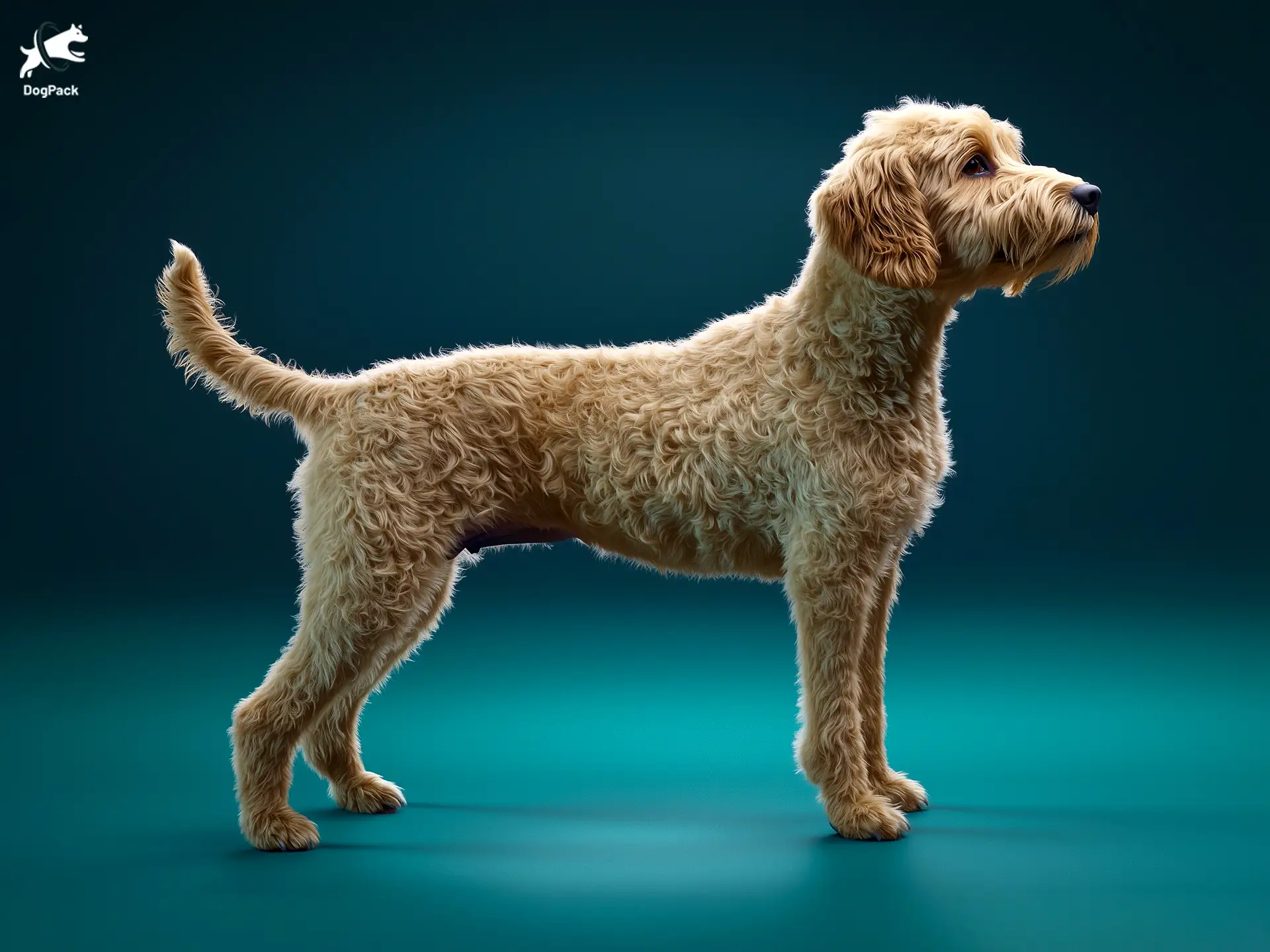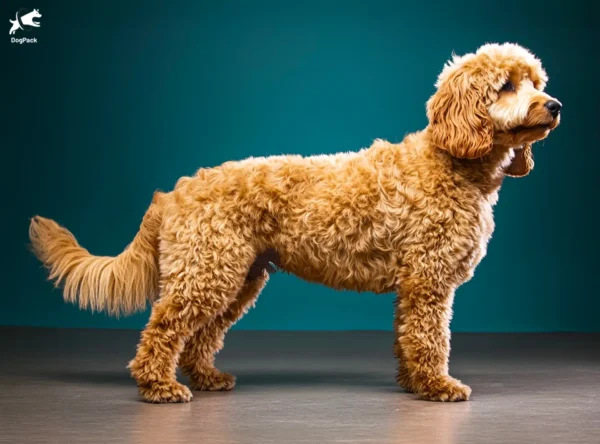Boxerdoodle Dog Breed Info & Overview
The Boxerdoodle, a charming mix of Boxer and Poodle, offers a blend of intelligence, energy, and affection. With their playful spirit and low-shedding coat, they make excellent family pets. Combining the Poodle’s sharp mind with the Boxer’s loyal nature, Boxerdoodles are the perfect companions for active households seeking both fun and devotion.
Characteristics
Pictures
Breed History
The Boxerdoodle is a relatively new hybrid, blending the playful Boxer with the intelligent Poodle. While there’s no detailed historical record, this crossbreed likely emerged in the United States during the designer dog trend of the late 20th century. Breeders aimed to combine the best traits of both parent breeds.
By mixing the Boxer’s loyalty and protective nature with the Poodle’s intelligence and hypoallergenic coat, the Boxerdoodle offers a unique companion. The Poodle’s lineage dates back to Germany and France as water retrievers, while the Boxer hails from Germany as a working dog.
This hybrid is still gaining popularity, but those who’ve welcomed a Boxerdoodle into their homes often praise their versatility and charm. Their development reflects a growing interest in dogs that fit modern family lifestyles, combining energy, affection, and low-shedding coats.
Temperament, Personality
Boxerdoodles are known for their energetic and affectionate personalities. They often inherit the Boxer’s playful and outgoing nature, making them great companions for active families. These dogs love to be involved in all family activities and thrive on attention and interaction.
Their Poodle lineage contributes intelligence and a keen eagerness to please, which makes training a rewarding experience. Boxerdoodles are typically friendly with strangers and can get along well with other pets if socialized early. Their sociable nature makes them less suited for being left alone for long periods.
Despite their high energy levels, they have a gentle side, especially around children. They often display patience and protective instincts, making them wonderful family dogs. Their combination of intelligence and playfulness ensures there’s never a dull moment with a Boxerdoodle around.
Physical Characteristics
Boxerdoodles can vary in appearance, but they often have a sturdy, athletic build inherited from the Boxer, coupled with the curly or wavy coat of the Poodle. Their size ranges from medium to large, depending on the size of the Poodle parent used in breeding.
They typically stand between 20 to 25 inches tall and weigh between 40 to 70 pounds. Their coats can come in a variety of colors, including fawn, brindle, black, white, or combinations thereof. The texture may range from curly to wavy, and they are often low-shedding.
Their eyes are usually expressive and alert, reflecting their intelligent nature. Ears can be floppy like a Poodle’s or more erect like a Boxer’s. Overall, the Boxerdoodle presents a balanced mix of both parent breeds, resulting in a distinctive and attractive appearance.
Health Issues
Boxerdoodles are generally healthy dogs, but they can inherit health issues common to their parent breeds. Potential concerns include hip dysplasia, which affects joint mobility, and heart conditions like cardiomyopathy. Regular veterinary check-ups are essential for early detection and management.
They may also be prone to allergies and skin conditions, possibly inherited from the Poodle side. Eye conditions such as progressive retinal atrophy could occur, so routine eye examinations are advisable. Ensuring your Boxerdoodle comes from a reputable breeder who conducts health screenings can mitigate risks.
Maintaining a healthy diet and regular exercise can contribute to their overall well-being. Preventive care, including vaccinations and parasite control, will help keep your Boxerdoodle healthy. Being proactive about their health can lead to a long, happy life together.
Grooming Needs
Boxerdoodles typically have moderate grooming needs. Their coats can range from curly to wavy and may be low-shedding, thanks to their Poodle heritage. Regular brushing—about two to three times a week—helps prevent matting and keeps their coat in good condition.
Depending on the coat type, professional grooming every six to eight weeks may be necessary to maintain a neat appearance. This includes trimming and possibly clipping to keep their coat manageable. Bathing should be done as needed, using dog-friendly shampoos to avoid skin irritation.
Don’t forget routine care like nail trimming, teeth brushing, and ear cleaning. Since Boxerdoodles can be prone to ear infections due to floppy ears, keeping them clean and dry is important. Establishing a grooming routine early makes the process easier for both you and your dog.
Exercise Requirements
High energy levels mean Boxerdoodles require plenty of exercise to stay happy and healthy. Aim for at least one to two hours of physical activity each day. This can include walks, runs, or playtime in a securely fenced yard.
They excel in activities that engage both mind and body, such as agility training or fetch games. Their intelligence means they appreciate variety, so mixing up routines can keep them stimulated. For more energetic companions, check out our Active Dog Breeds.
Without sufficient exercise, Boxerdoodles may become bored and develop undesirable behaviors like chewing or excessive barking. Regular activity not only keeps them physically fit but also supports their mental well-being. An active owner will find a joyful companion in this breed.
Training Tips
Training a Boxerdoodle can be a rewarding experience due to their intelligence and eagerness to please. Positive reinforcement techniques work best, using treats, praise, and play to motivate them. Early obedience training sets the foundation for good behavior.
Consistency is key, as is keeping training sessions fun and engaging. Boxerdoodles may have a stubborn streak from their Boxer side, so patience is important. Short, varied training sessions prevent boredom and keep their attention focused.
Socialization from a young age helps them become well-rounded adults. Expose them to different environments, people, and other animals. This can reduce potential issues like shyness or overprotectiveness, making your Boxerdoodle a confident and friendly companion.
Nutrition, Diet
Feeding your Boxerdoodle a balanced diet is crucial for their health. High-quality dog food formulated for medium to large breeds with high energy levels is recommended. Protein-rich diets support their active lifestyle and muscle development.
Portion sizes depend on their age, weight, and activity level, but generally, they may require between 2.5 to 3.5 cups of dry food per day, divided into two meals. Monitoring their weight and adjusting food intake helps prevent obesity, which can lead to health issues.
Consult your veterinarian for personalized dietary advice, especially if your Boxerdoodle has specific health concerns or allergies. Some may benefit from diets that support joint health or skin condition. Fresh water should always be available to keep them hydrated.
Adoption, Breeders
When looking to welcome a Boxerdoodle into your home, consider reputable breeders who prioritize health and temperament. Ask for health clearances for both parent breeds to ensure your puppy has the best start in life. Visiting the breeder can provide insight into the puppies’ environment.
Adoption is another wonderful option. Check local shelters or rescue organizations that specialize in hybrid breeds. Websites like Petfinder and Adopt-a-Pet often list Boxerdoodles in need of homes.
Be cautious of breeders who lack transparency or offer unusually low prices. Responsible breeders will be happy to answer questions and provide references. Whether adopting or buying, ensuring your Boxerdoodle comes from a reputable source contributes to a healthier, happier pet.
Family Pet?
Boxerdoodles make excellent family pets, especially for active households. Their playful and affectionate nature means they often bond closely with family members. They’re known to be patient and gentle with children, making them great playmates.
Their protective instincts can add a sense of security, but they are generally friendly and welcoming to guests if properly socialized. Boxerdoodles thrive on companionship and may not do well if left alone for long periods.
They get along with other pets when introduced properly, though early socialization is important. Their energetic nature means they appreciate a family that can match their activity level. Overall, they bring joy and vitality to family life.
Right For You?
If you’re an active individual or family looking for a loyal and energetic companion, the Boxerdoodle might be a perfect fit. They require time and attention, especially regarding exercise and interaction, so they’re best suited for those who can commit to an active lifestyle.
Their moderate grooming needs and low-shedding coat can be a bonus for those with allergies. However, they may not be ideal for apartment living due to their energy levels. Access to outdoor space can greatly benefit their well-being.
Consider your ability to meet their physical and mental needs before bringing a Boxerdoodle home. If you’re ready for a playful, intelligent, and affectionate dog that thrives on companionship, this hybrid could be the right choice for you.
Conclusion
The Boxerdoodle combines the best of the Boxer and Poodle into a lively, intelligent, and affectionate companion. They make excellent family pets for those who can match their energy and provide ample companionship. If you’re seeking a playful, low-shedding dog that brings joy and loyalty into your home, the Boxerdoodle may just be your perfect match.
FAQs
-
Do Boxerdoodles inherit the Boxer’s protective instincts?
Yes, Boxerdoodles can inherit the Boxer’s protective nature. While they are generally friendly, their alertness may cause them to be cautious around strangers, making them good watchdogs with proper training.
-
How well do Boxerdoodles adapt to apartment living?
Boxerdoodles can adapt to apartment living if they receive sufficient daily exercise. Their energy levels require ample physical and mental stimulation to prevent boredom in smaller living spaces.
-
Are Boxerdoodles prone to separation anxiety?
Yes, Boxerdoodles can develop separation anxiety if left alone for extended periods. They thrive on companionship and may become anxious without regular interaction, so they do best in homes where someone is present most of the time.
-
What types of activities do Boxerdoodles enjoy?
Boxerdoodles love engaging activities that challenge both their mind and body. Agility training, puzzle toys, and interactive games are great ways to keep them entertained and mentally stimulated.
-
How often should you groom a Boxerdoodle?
The grooming needs of a Boxerdoodle depend on their coat type. If they inherit a curly coat from the Poodle, regular brushing and professional grooming every 6–8 weeks may be necessary to prevent matting.
Breed Ratings
The Boxerdoodle is highly intelligent, benefiting from the Poodle’s renowned smarts, making training easier and more enjoyable.
With a playful spirit inherited from the Boxer, this breed loves to engage in fun activities and games with their family.
High energy levels mean they thrive in active households where they can get plenty of exercise and stimulation.
Thanks to their Poodle heritage, Boxerdoodles tend to be low to moderate shedders, suitable for those who prefer less fur around the home.
They may have a moderate prey drive; early training can help manage any chasing tendencies towards smaller animals.
Grooming needs are moderate; regular brushing and occasional professional grooming keep their coat in top condition.
Intelligent and eager to please, they respond well to positive reinforcement training methods.
Boxerdoodles prefer company and may experience separation anxiety if left alone for extended periods.
They may bark to alert but are not typically excessive barkers; training can help manage vocalization.
Drooling is usually minimal, though some individuals may drool more if they take after the Boxer parent.
Generally friendly towards other dogs, especially when socialized from a young age.
Typically healthy but can be prone to certain genetic conditions; regular vet care is important.













